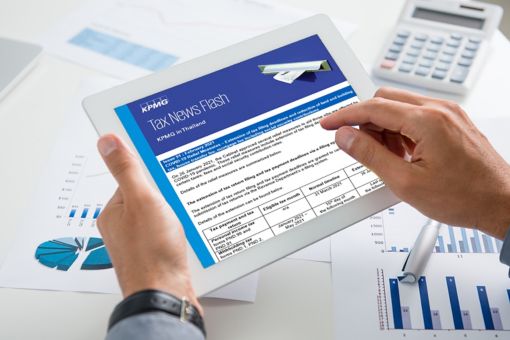Draft Ministerial Regulations: Transfer Pricing is on the Move
Tax & Legal News Flash Issue 61
On 18 June 2019, the Ministry of Finance submitted for the Thai Cabinet’s further consideration a draft Ministerial Regulation (“Draft MR”) containing information necessary for taxpayers to prepare for TP documentation lodgment. The Draft MR is issued in order to enable the fair and effective implementation of Thailand’s new Transfer Pricing (“TP”) law (i.e. announced in the Royal Gazette on 21 November 2018).

The key highlights from the submitted version of the Draft MR are summarized below:
- According to the Draft MR, TP documentation and reviews should not be focused only on prices applied on related party transactions but also on gross margin, profit margin, and/or shared profits derived from related party transactions.
- Moreover, the Draft MR clarifies that if the price applied to a controlled transaction (i.e. transaction between two enterprises that are associated enterprises with respect to each other) and tested using an appropriate TP method is deemed to fall within the arm’s length range, then no TP adjustment should be required. Although the Draft MR does not define the arm’s length range under which the applicable price/margin should fall, considering the TRD’s current practice under TP audits, it appears that the TRD tends to accept that a price/margin should be at arm’s length if a price/margin falls within interquartile arm’s length range established from independent internal or external comparables.
- The TRD’s previous TP guideline, Department Instruction No. Paw 113/2545 (“Paw 113”), specifically suggests three TP methods including Comparable Uncontrolled Price, Resale Price, and Cost Plus Methods. If those three methods are not available or not reliable, other methods internationally acceptable and suitable for TP facts of relevant cases can be applied.
- However, with this Draft MR there will be five TP methods - three abovementioned methods plus Transactional Net Margin and Transactional Profit Spilt Methods which are more consistent with OECD TP Guidelines.
- No specific order or hierarchy is established on how to choose from the abovementioned TP methods. Any method can be applied based on its strengths and weaknesses, availability of reliable information and appropriateness and degree of comparability.
- Moreover, the new Draft MR introduces a comparability analysis to be taken into consideration for setting and testing transfer prices (i.e. which was not previously established under Paw 113) similar to the one established under the OECD’s TP Guidelines, including the following:
- Contractual terms;
- Functions performed by taking into consideration the assets used and risks assumed;
- Characteristics of assets transferred or services performed;
- Economic circumstances at the time of entering into the transaction; and
- Business strategies adopted by related parties.
- With respect to controlled service transactions, the Draft MR establishes that if the services are not actually provided, economically or commercially not beneficial to service the recipient and if the service recipient would not be willing to pay for these services from a third party, then the service charges should not be allowed as revenue and expenses for corporate income tax (“CIT”) calculation purposes.
- In addition, with respect to controlled transactions relating to intangible property, the Draft MR establishes that the following factors should be taken into account: (1) rationale of both related parties; (2) pricing of the charges; and (3) value and benefits to the business of the licensees or transferees.
- Moreover, it is established that when analyzing the comparability of the price applied in the controlled intangible property transaction, the taxpayer needs to evaluate the following:
(1) Expected benefits from the intangible property in question;
(2) Geographical limitation to use the intangible property right;
(3) Unique or non-unique characteristics of the intangible property; and
(4) Rights to co-develop the intangible property in future.
- Relevantly, the Draft MR establishes that that there will be a secondary TP adjustment (i.e. this is consistent with TRD’s adopted practice under recent TP audits). When a primary TP adjustment is made resulting in higher profits for one taxpayer, if the counterparty of the controlled transaction is a shareholder of the taxpayer, the TP adjustment amount after deducting additional CIT will be deemed dividends or profit sharing and subject to 10 percent withholding tax based on local tax law. In case the counterparty is not a shareholder of the taxpayer, the TP adjustment amount after deducting additional CIT should be deemed interest payment subject to withholding tax at the rate applicable based on local tax law.
In light of the above, it is worth mentioning that the Draft MR now released appears to confirm that the Thai Revenue Department ("TRD") is moving towards implementation of the OECD’s TP Guidelines in Thailand.
KPMG’s observations and recommendations
With additional guidance now having been released with respect to preparation of the TP documentation required under Thailand’s new TP law, multinationals investing in Thailand and Thai corporations entering into related party transactions and with income from its business (or related income deriving from its business) exceeding Baht 200 Million, should pro-actively start preparing robust TP analysis and documentation.
This will be essential to an effective management of the risks associated with Thailand’s new detailed TP law and strict documentation requirements but will also be the key to support negotiations with the tax authorities on future proposed primary and secondary TP adjustments or imposed penalties (if any).
How KPMG can help
KPMG professionals in the transfer pricing group advise multinational corporations investing inbound and Thai corporations investing outbound on transfer pricing solutions to their value chain issues. Our Transfer Pricing team is well positioned to provide risk assessment reports in line with your global transfer pricing strategy to enable you to navigate through the complex and fast-changing transfer pricing environment resulting from the new regulatory changes in Thailand, as well as to support you in preparing transfer pricing documentation, Local File and Master File under the new requirements.
Connect with us
- Find office locations kpmg.findOfficeLocations
- kpmg.emailUs
- Social media @ KPMG kpmg.socialMedia


